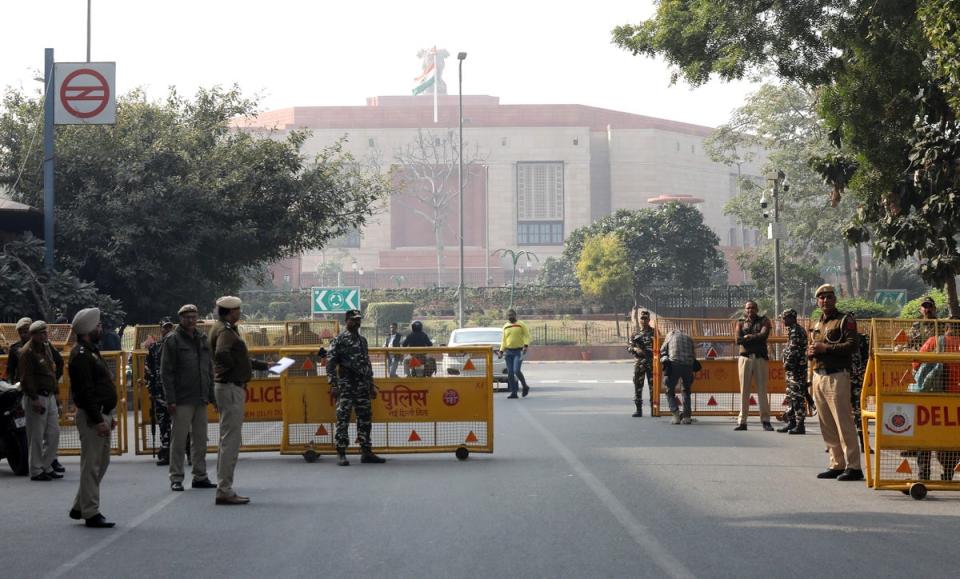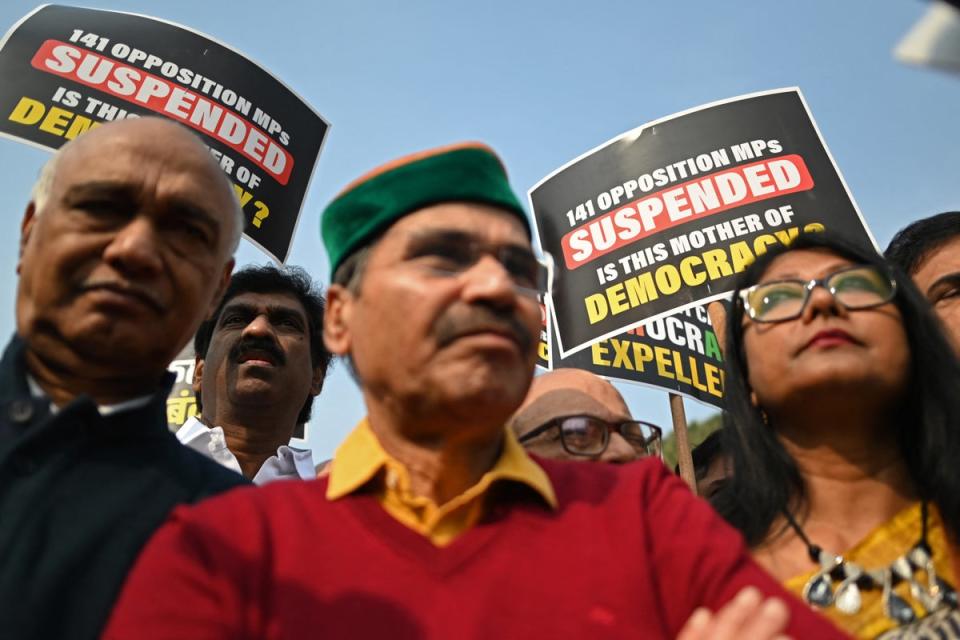India’s parliament has introduced the biggest changes to the country’s criminal justice system in 150 years, at a time when a large majority of opposition MPs were suspended from the lower house.
The package of reforms replaces India’s Penal Code, drafted by colonial power Britain in the 19th century, and includes some controversial measures such as extending the limit on police detention without charge from the current 15 days to a maximum of 90 days.
Despite the importance of the changes, the new laws were passed late Thursday by unanimous vote and without debate. Meanwhile, more than 140 suspended opposition MPs protested outside Parliament, accusing Prime Minister Narendra Modi of stifling the country’s parliamentary democracy.
The MPs were suspended for repeatedly demanding a debate in Parliament over a December 13 security breach in which two protesters stormed the chamber by jumping from the visitors’ gallery and releasing yellow smoke canisters. The Speaker of the Lower House, Lok Sabha, subsequently suspended a record number of MPs for disrupting the proceedings of the House.
Other major changes in the new laws include the classification of terrorist crimes under ordinary criminal procedure, the formal decriminalization of homosexuality and adultery – already decriminalized in practice – and the introduction of community service as a new form of punishment.


Sedition, a provision long seen as a symbol of the colonial legacy in the Indian legal system and made unenforceable by India’s Supreme Court, has been officially repealed and replaced by another controversial provision on treason.
The Hon’ble Home Minister said that three copies of the settler print have been withdrawn
The facts are different:
1) Sedition was read strictly and registration of FIRs for sedition was banned by the Supreme Court
2 seconds. 377 of the IPC regarding homosexuality…
— P. Chidambaram (@PChidambaram_IN) December 21, 2023
“Any activity will be considered treason only if it is intended against the integrity, sovereignty and unity of the nation and not merely because it is against the government,” Home Minister Amit Shah said while condemning deviation from the definition of sedition emphasized.
“Anyone can say anything against the government, but if anyone interferes with the country’s flag, security or property, he will go to jail,” he explained. The new law will criminalize treason caused by armed revolution and destructive and separatist activities. The government has also introduced the death penalty for mob lynching.
Prime Minister Narendra Modi welcomed the passage of the bills, calling it “a turning point” in the country’s history.
“These bills mark the end of colonial-era laws. A new era begins with laws that focus on public service and welfare,” he said.
The passage of Bharatiya Nagarik Suraksha Sanhita, 2023, Bharatiya Nyaya Sanhita, 2023 and Bharatiya Sakshya Adhiniyam, 2023 is a turning point in our history. These bills mark the end of colonial-era laws. A new era begins with laws that focus on public service and welfare.
— Narendra Modi (@narendramodi) December 21, 2023
“These transformative bills are a testament to India’s commitment to reform. They bring our legal, policing and investigative systems into the modern era, with an emphasis on technology and forensic science. These bills will ensure better protection of the poor, marginalized and vulnerable sections of our society.”
The Indian Penal Code (IPC), which covers a wide range of offences, was introduced by the British in 1860 and has been amended approximately 77 times. However, with inadequate police investigations, prisons full of undertrials and slow-moving courts, certain voices called for an overhaul of India’s criminal justice system, seeing it as outdated and reminiscent of colonial times.
Suggestions from Supreme Court and Supreme Court judges, governors, civil servants, police officers, parliamentarians, chief ministers of states, collectors and members of legislative assemblies were taken into consideration before the proposed laws were given final shape, Mr Shah said.
Opposition parties expressed concern that the bills were passed without discussion, questioning whether they would really solve the problems of the old criminal code in its current form.
Members of the 26-party opposition alliance, known as the INDIA Bloc, said they are considering moving the Supreme Court in a bid to address several loopholes introduced in the three new laws, local media reported.
Opposition leaders and researchers have rejected the government’s claim that the new law is a revision, saying it retains most of the provision from the 160-year-old Indian Penal Code authored by British historian Thomas Babington Macaulay, adding it adding that the changes could simply have been implemented. amended instead of replacing them with new bills.
More #MPs #suspended massively today. So the opposition has been completely wiped out!!
Congratulations to Modi Sarkar for bringing the nation in line with North Korea and China.
Obituaries on the death of #democracy!
Sure!!
— Abhishek Singhvi (@DrAMSinghvi) December 19, 2023
“Has the government really ditched Britain’s ‘colonial’ penal laws?” asked P. Chidambaram, a lawmaker from the opposition Congress Party. “Consider the fact that 90-95% of the IPC, 95% of the CrPC and 99% of the Evidence Act have been cut, copied and pasted in the three bills: can anyone deny or question that fact?” he wrote on X.
“The stated aim of the three bills is that we decolonize the criminal justice system and create citizen-centric procedures,” said Naveed Mehmood Ahmad, a senior fellow at the Vidhi Center for Legal Policy, a Delhi-based think tank.
“Systemic reforms are necessary. And generally, when you see governments taking on such tasks, you see incremental reforms, amendments here and there. But the idea that they explored was that maybe we can solve everything at once and address all the issues of trial evidence and substantive law in their entirety. The idea might have been okay. But there is nothing in terms of how these provisions, how the new bills change things on the ground,” he says The independent.


“Of course there is a new name, a number of provisions have been adjusted [but] most of the law remains the same,” he says. “And if you look at the problems that the criminal justice system is facing in India in terms of over-criminalization, in terms of delays, over-incarceration of subjects, there’s not much that these bills do to check that.”
The government does not provide a clear path on what to decolonize and why decolonization is necessary. “Just because the law is old and comes from the British Times doesn’t make it necessary,” he explains
“When I say we have done nothing in terms of decolonization, we should have looked at provisions that reflect the colonial mentality and these are provisions that give the police broad powers of arrest.”
This is reflected in the new provision increasing police custody from 15 days to 90 days – a provision considered “ten times more draconian” than the British-era Criminal Code.